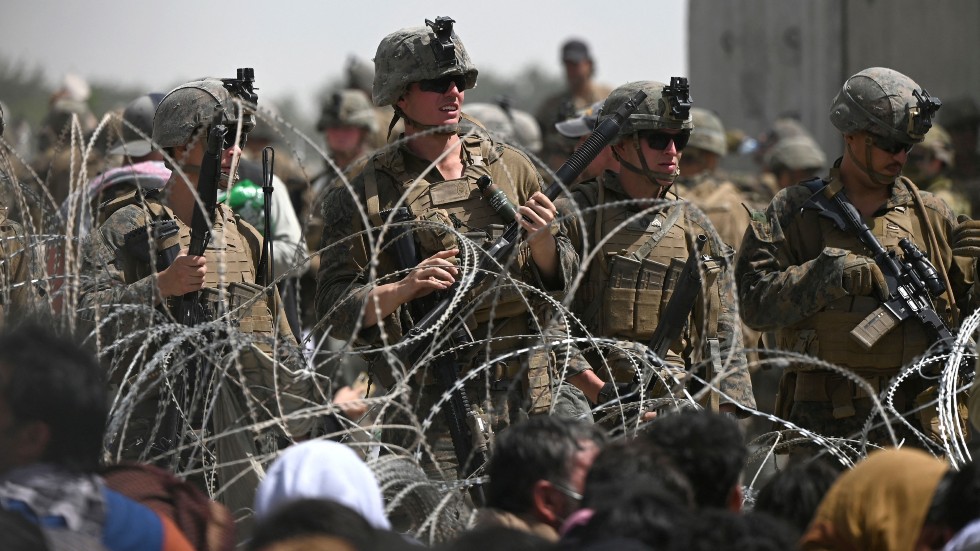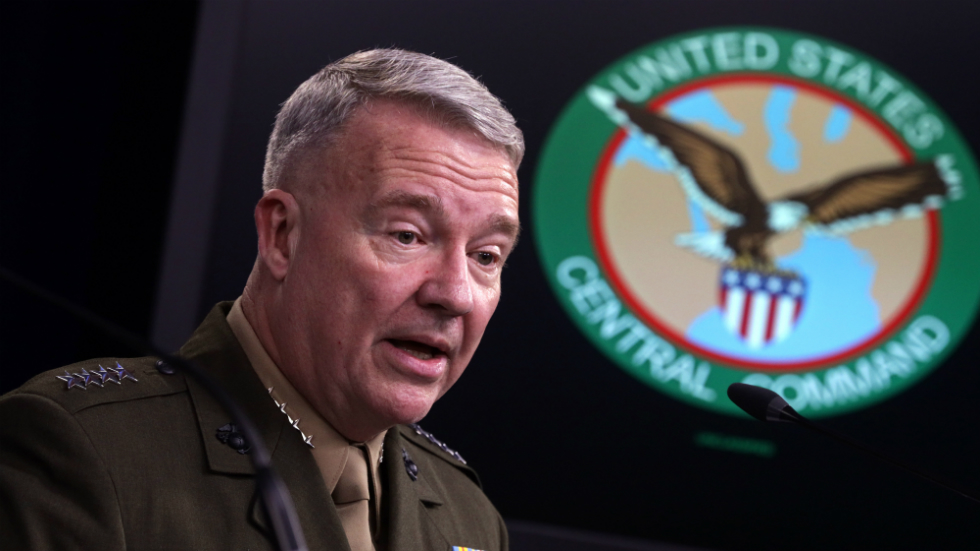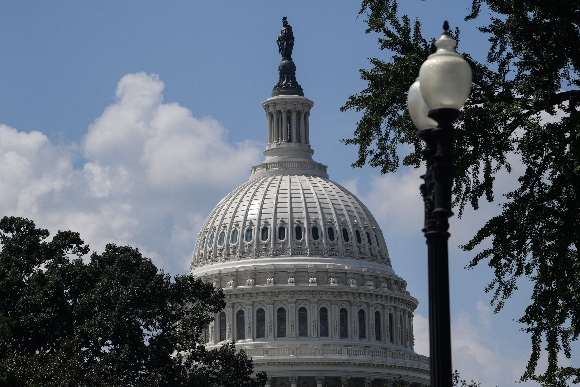Overnight Defense & National Security — America’s longest war ends

It’s Monday, welcome to Overnight Defense, your nightly guide to the latest developments at the Pentagon, on Capitol Hill and beyond. Subscribe here: digital-stage.thehill.com/newsletter-signup.
The last U.S. military plane flew out of Kabul just before midnight in Afghanistan, capping America’s 20-year war there.
But not all Americans and Afghan allies were able to get out before evacuations ended.
Back in Washington, the House Armed Services Committee is gearing up for its big defense bill debate later this week.
For The Hill, we’re Ellen Mitchell and Rebecca Kheel. Write to us with tips: emitchell@digital-stage.thehill.com and rkheel@digital-stage.thehill.com.
Let’s get to it.
US fully withdraws from Afghanistan

The announcement came just after 4:30 p.m. Monday afternoon.
About an hour earlier, the last U.S. military C-17 cargo plane lifted off from the Kabul airport, taking with it the acting U.S. ambassador to Afghanistan and the U.S. general that was in charge of securing the airport.
And with that, the United States’ 20 year war in Afghanistan was over.
“I’m here to announce the completion of our withdrawal from Afghanistan and the end of the mission to evacuate American citizens, third-country nationals and vulnerable Afghans,” U.S. Central Command chief Gen. Frank McKenzie told reporters at the Pentagon.
“Every single US service member is now out of Afghanistan,” he added.
The last to leave: McKenzie could not say how many people were aboard the aircraft or where it was headed, as it is still in flight, but he confirmed that 82nd Airborne Division head Maj. Gen. Christopher Donahue and Ambassador Ross Wilson were on board and “were in fact the last people to stand on the ground, step on the airplane.”
The flight also carried the last remaining U.S. troops and the core diplomatic staff of the U.S. embassy in Kabul.
McKenzie said no American civilians were on the last five flights to leave.
Cleaning up: McKenzie also the end of the withdrawal included destroying some equipment U.S. forces left at the airport.
That includes an air defense system known as C-RAM, 70 mine-resistant ambush protected vehicles, 27 Humvees and 70 aircraft.
Danger till the end: U.S. officials had been warning the end of the withdrawal would be its most dangerous time.
That danger was underscored with a rocket attack targeting the Kabul airport on Monday, though no casualties were reported.
Of the five rockets lobbed at the airport, three missed the target, one was intercepted by the C-RAM and one landed within the airport perimeter but had “no effect,” per the Pentagon.
Hundreds of Americans remain

Though the military evacuation is over, some Americans who wanted to leave Afghanistan remain in the country, McKenzie acknowledged.
McKenzie said the number of Americans who wanted to leave and who were not evacuated is in the “very low hundreds.”
The final flights: McKenzie also said no American civilians were evacuated on the final five flights out of Kabul’s international airport, where the U.S. evacuation mission was located.
“We maintained the ability to bring them in up until immediately before departure but we were not able to bring any Americans out,” McKenzie said. “None of them made it to the airport and were able to be accommodated.”
The next chapter: While all U.S. troops have left Afghanistan, U.S. officials say diplomatic efforts to evacuate U.S. citizens and at-risk Afghans will continue. McKenzie expressed confidence U.S. officials would be able to evacuate these remaining Americans through diplomatic efforts.
“The military phase of this operation is ended. The diplomatic sequel to that will now begin,” McKenzie said.
“I believe that we’re going to get those people out, I think we’re also going to negotiate very hard and very aggressively to get our other Afghan partners out,” he added. “Our desire to bring these people out remains as intense as it was before.”
How many?: Secretary of State Antony Blinken said later Monday that “under 200 and likely closer to 100” Americans who want to leave remain in Afghanistan, but that officials were still working to determine the exact number.
Reaction: Republicans were quick Monday with criticism after the administration acknowledged Americans were still in Afghanistan.
“This national disgrace is the direct result of President Biden’s cowardice and incompetence,” Sen. Ben Sasse (R-Neb.) said in a statement. “The president made the decision to break our word to our Afghan partners. The president made the decision to tell one lie after another as the crisis unfolded. The president made the morally indefensible decision to leave Americans behind. Dishonor was the president’s choice. May history never forget this cowardice.”
“President Biden told the American people: ‘If there’s American citizens left, we’re gonna stay to get them all out.’ He didn’t keep his word,” House Armed Services Committee ranking member Mike Rogers said in a statement. “Hundreds of Americans are now stuck in Afghanistan at the mercy of the Taliban and ISIS-K.”
BIDEN TO SPEAK TUESDAY
McKenzie, not President Biden, was the official tasked with announcing the end of U.S. military involvement in Afghanistan.
But Biden will speak to the nation Tuesday about the end of the war in Afghanistan.
Written statement: Biden, in a statement a short time after the Pentagon confirmed the end of the war, thanked the U.S. military for its service. He said he would offer a lengthier explanation on Tuesday or his decision not to extend the mission into September.
“For now, I will report that it was the unanimous recommendation of the Joint Chiefs and of all of our commanders on the ground to end our airlift mission as planned,” Biden said. “Their view was that ending our military mission was the best way to protect the lives of our troops, and secure the prospects of civilian departures for those who want to leave Afghanistan in the weeks and months ahead.”
Next steps: Biden said in his statement that he’s tasked Secretary of State Antony Blinken to coordinate efforts to ensure Americans and Afghan allies can safely leave Afghanistan in the coming weeks.
“The Taliban has made commitments on safe passage and the world will hold them to their commitments,” Biden said. “It will include ongoing diplomacy in Afghanistan and coordination with partners in the region to reopen the airport allowing for continued departure for those who want to leave and delivery of humanitarian assistance to the people of Afghanistan.”
NDAA season kicks into high gear

With all the Afghanistan news, the House Armed Services Committee’s upcoming defense bill debate has flown somewhat under the radar.
But the committee is indeed slated to hold its marathon National Defense Authorization Act (NDAA) markup on Wednesday.
Ahead of that, the committee formally released what’s known as the chairman’s mark Monday, as well as a summary.
Sexual assault: Among the provision of the chairman’s mark are the changes to prosecuting military sexual assault that were recommended by the Pentagon.
That means removing commanders from the decision to prosecute sexual assault and related crimes and creating special victim prosecutors to handle that.
Still, expect continued debate on the issue from those who want to go further and remove all serious crimes from the chain of command.
Afghanistan: Also of note in the chairman’s mark, most of the funding that had been expected to be authorized for the now defunct Afghan security forces has been reallocated elsewhere, save for $350 million to cover “costs associated with the termination of Operation Freedom’s Sentinel and termination of related support to the security forces of the Government of Afghanistan, including costs for returning equipment and other materiel taken into DoD stock, contract termination, and other close out costs,” per the summary.
MONEY, MONEY, MONEY, MONEY
As expected, the overall amount of defense funding is already shaping up to be a premier fight in the NDAA.
The chairman’s mark adheres to the Biden administration’s request of $744 billion for defense, including $716 billion for the Pentagon.
Republicans ready: Shortly after the chairman’s mark was released Monday, Republicans on the committee unveiled the amendment they are planning to introduce Wednesday to increase the topline.
The amendment from ranking member Rep. Mike Rogers (R-Ala.) would add nearly $25 billion to the topline.
“We cannot afford to cut corners and play politics with our national security, unfortunately that is all President Biden has done,” Rogers said in a statement. “From China to Russia to Iran to North Korea to the threat of global terrorism – the United States faces no shortage of adversaries who work around the clock seeking ways to supplant or inflict harm on our nation.”
Dem backing: At least one Democrat has already said she’s backing the Republican amendment.
“I have stressed for months that the current budget fails to adequately address the rising threats of China, Iran and Russia. I’ll vote to increase defense spending by $25B to send a strong message to our allies and adversaries that we are not backing down,” Rep. Elaine Luria (D-Va.) tweeted Monday.
The committee is split 31 Democrats to 28 Republicans, leaving little room for error if Democrats hope to defeat the amendment.
Progressive pushback: Also Monday, Democratic Reps. Mark Pocan (Wis.) and Barbara Lee (Calif.), along with 25 other Democrats, penned a letter calling on the committee to reject Republican efforts to add $25 billion to the defense budget.
“At a time when America’s largest national security threat is a global pandemic, our spending priorities should embrace efforts such as increased COVID vaccination efforts abroad instead of continually increased military spending – especially during a period of military withdrawal from foreign wars,” they wrote.
Reminder: The Senate Armed Services Committee already voted to increase Biden’s defense budget by $25 billion, with strong Democratic backing.
And while some House Democrats may be loath to do the same, the NDAA typically needs Republican support to pass since progressives regularly vote against it regardless of the funding level.
ON TAP FOR TOMORROW
- The Heritage Foundation will host an event on the prospect for women and girls in Afghanistan with speakers including former Afghan ambassador to the U.S. Roya Rahmani at 10 a.m. https://herit.ag/3zw65tE
- House Armed Services Committee Chairman Adam Smith (D-Wash.) will speak at a Brookings Institution webcast at 10 a.m. https://brook.gs/38voY3O
WHAT WE’RE READING
- The Hill: Watchdog sees signs North Korea has restarted nuclear reactor
- The Hill: Marine officer to resign after questioning senior leaders’ decisions on Afghanistan
- The Hill: White House: Biden told commanders to ‘stop at nothing’ to go after ISIS
- The Hill: 5,200 National Guard troops activated to aid with Ida aftermath
- The Hill: Pentagon acknowledges reports of civilian casualties in US airstrike in Kabul
- The Hill: Biden mourns service members killed in Kabul bombing at dignified transfer
- The Hill: Opinion: Even with terrorism in Afghanistan, China remains the greater threat
That’s it for today. Check out The Hill’s defense and national security pages for the latest coverage. We’ll see you Tuesday.
Copyright 2023 Nexstar Media Inc. All rights reserved. This material may not be published, broadcast, rewritten, or redistributed. Regular the hill posts







